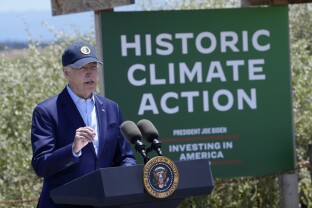President Joe Biden’s Department of Energy has thrown its final gauntlet in the fight over the future of natural gas: a highly anticipated new report that details the negative impacts of dramatically increasing exports.
The report could become a procedural snag for a key pillar of Donald Trump’s energy agenda. The president-elect has promised to immediately begin issuing new permits for liquefied natural gas exports.
Biden’s administration examined the effects of increasing LNG exports during a yearlong pause on all new export permit approvals.
The top-line findings: More exports will likely raise Americans’ energy bills and the costs of consumer goods, as well as dramatically increase global carbon emissions.
The United States is currently the world’s largest LNG exporter, surpassing Qatar. Biden’s administration paused new export permits in January 2024, after having already approved enough permits to account for nearly half of today’s total U.S. natural gas production.
“The study put forward today finds that unfettered exports of LNG would increase wholesale domestic natural gas prices by over 30%. Unconstrained exports of LNG would increase costs for the average American household by well over $100 more per year by 2050,” Secretary of Energy Jennifer Granholm wrote in an accompanying statement. “And in every scenario, increases in LNG exports would lead to increases in global net emissions — despite very aggressive assumptions in the model regarding deployment of carbon capture, utilization, and storage.”
While those findings will not change a Trump DOE’s ability to issue new permits, they will likely strengthen legal challenges against those efforts, meaning the incoming Trump administration may have to put extra time and resources toward shoring up permits when they are issued, attorneys and energy analysts told NOTUS.
The study, which was conducted by the national laboratories, will need to be included by reference in permit approvals, and thus, its findings must be addressed when the administration justifies why a permit is in the public interest.
Republicans in Congress preemptively attacked the study at a hearing in late November, accusing the DOE’s Office of Fossil Energy and Carbon Management of skewing the research to favor their climate goals. They also questioned the integrity of the scientific process and suggested that past research on LNG exports, conducted before the U.S. became the global leader in LNG exports, is sufficient.
“Science seems to have been departed from, especially when considering the public interest,” Rep. August Pfluger said at the hearing last month.
The LNG industry has argued that increasing exports would displace coal power generation and thus improve carbon emissions. The study reached a different conclusion: Increasing LNG exports more than the status quo would ultimately replace more renewable energy sources than coal power. The researchers also included estimates for the social cost of carbon emissions — a departure from previous studies, which have not considered the cost of emissions as a factor — ranging anywhere from $3 billion to $500 billion depending on the scenario modeled.
Advocates for increased LNG exports are already questioning the Biden administration’s statements surrounding the study.
“As we continue to examine the report, we have found that much of the narrative from the administration on the need for a pause in LNG export authorizations and their framing of the study results runs counter to the actual findings of the report. We are prepared to closely examine this study and compare its results to previous studies commissioned by the DOE on this topic,” said Charlie Riedl, the executive director of the Center for LNG, in a statement after the study was released.
Past studies have concluded that increasing LNG exports would have relatively minor impacts on U.S. consumer prices, a finding frequently cited by those in the LNG industry to justify increased exports. The new study finds a wide range of price impacts. One scenario suggested households could see an average $122 increase annually in electricity and energy costs.
“NGSA strongly stands by the fact that the U.S. natural gas industry, including its export as LNG, immensely benefits domestic consumers,” said Dena Wiggins, the president and CEO of the Natural Gas Supply Association.
Demand for new LNG will likely come mostly from China, not Europe, by the time the new export facilities come online, according to the research. Granholm suggested in her statement that approval based on the “public interest” should include factors such as China’s relationship with the U.S.
“PRC entities have already signed several contracts with operating or proposed U.S. LNG projects. Future authorization decisions of what is in the ‘public interest’ need not be made solely on a binary — yes or no — basis but could be undertaken using a broader framework of requirements for all authorizations,” she wrote.
Groups opposed to increasing LNG exports, such as Public Citizen, are already signaling that China’s LNG demand will become a familiar line of attack.
“Today’s study makes clear that all pending export applications must be denied as being inconsistent with the public interest and should result in a reassessment of existing exports to determine compatibility with the public interest. Using LNG exports to provide energy abundance for China at the expense of higher utility bills for working Americans is not in the public interest,” said Tyson Slocum, the director of Public Citizen’s energy program.
—
Anna Kramer is a reporter at NOTUS.
Sign in
Log into your free account with your email. Don’t have one?
Check your email for a one-time code.
We sent a 4-digit code to . Enter the pin to confirm your account.
New code will be available in 1:00
Let’s try this again.
We encountered an error with the passcode sent to . Please reenter your email.


